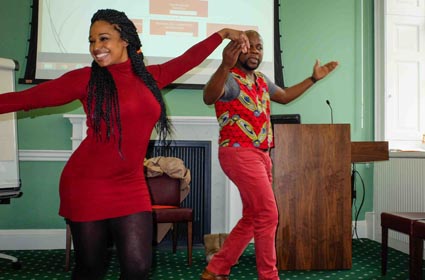Connecting research and dance
Earlier this month King’s hosted a unique event to explore the history and political significance of Angolan couple dances as part of the ERC-funded research project ‘Modern Moves’. Experienced practitioners and academic experts from across the world took part in workshops to explore the conditions in which these dances developed in Angola as well as their sudden global popularity.
Angola, a former Portuguese colony, was decolonized only in 1975 and subsequently plunged into civil war in the shadow of cold war politics. Participants were keen to explore what Angola’s history tells us about decolonisation and postcolonialism in the Portuguese-speaking world. The workshops provided a forum for passionate debate, discussions around difficult histories of war and displacement as well as the sharing of dance steps.
The ‘Modern Moves’ project aims to rethink the meaning of modernity, postcolonialism and post-trauma by examining the global popularity of African dance practices. Despite their traumatic origins in the colonisation of Africa and the forced displacement of African peoples and their enslavement throughout the Americas and the Caribbean, these dances have become synonymous with the kinetic and pleasurable dimensions of urban modernity.

Workshop participants commented that the day was ‘an incredible experience’, ‘a real honour’ and ‘a great opportunity’. They included, from Lisbon, Mestre Petchu and Vanessa Carvalho of Ballet Tradicional Kilandukilu, and Kwenda Lima, creator of Kwenda Lima and Kaizen Dance; Ricardo Sousa and Paula Loureiro of AfroLatin Connection, Oporto; Iris de Brito of Studio AfroLatin, London; Edson Monteiro and Riquita Alta, established teachers in Britain; Professor Marissa Moorman of the University of Indiana, Dr Fred Moehn from the Department of Music at King’s, and the Modern Moves team led by Professor Ananya Kabir from the Department of English.
Group image courtesy of Elina Djebbari, dancing image courtesy of Fred Moehn.